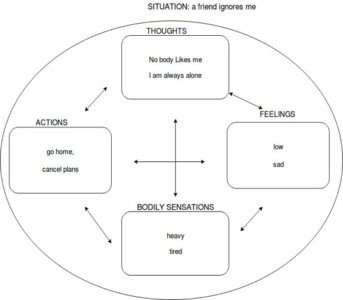What is mindfulness and how can it be used in therapy? Mindfulness is defined as…

Join us as a therapist

With so many types of therapy available out there, how can we choose what is right for us? The following short passages illustrate the main types of therapy to help you chose what is best for you.
In my approach, I integrate the following therapies to better respond to and address any clients’ need.
WHAT IS CBT:
CBT (cognitive behavioral therapy) is a form of therapy that has been scientifically proven to improve many psychological difficulties. Anything from anxiety disorders such as general anxiety, OCD (Obsessive Compulsive Disorder) PTSD (Post Traumatic Stress Disorder) to stress and depression, low self-esteem and severe emotional difficulties. CBT looks at the links between our thoughts, feelings, bodily sensations and actions. In any given situation all of these elements are interlinked with each other and influence each other. So by changing the way we think about something or the way we act in a situation, we can change the way we feel, both emotionally and physically about that situation. And situation after situation we can change our lives for the better.
What we think and what we do affect the way we feel, which in return affects what we think and the way we act. Therapy looks at identifying unhelpful thinking patterns and unhelpful behavioral patterns, experimenting with new behaviors and challenging unhelpful thoughts. The therapy is present and future focused while past experiences are explored when they present a block in moving forward in the present.

WHAT IS ACT:
ACT (Acceptance and Commitment Therapy) is a third wave development of CBT. It is mainly a behavioral approach, which incorporates Mindfulness to create a different relationship with painful thoughts and feelings. Rather than challenging unhelpful thoughts as in CBT, ACT teaches to observe the thought as a mental event, unable to hurt you and to which you do not have to act upon. ACT takes the idea that thoughts are thoughts, not facts to the next level by underlying the fact that people always have a choice to act in line with their values and learn to distance from thoughts (including memories) that are unhelpful or hurtful. The mindfulness training is an essential part of the therapy as it creates the ability to separate the person from the thoughts.
Another essential element of ACT are values, which in therapy are identified and used to guide and motivate behavioral change. The Acceptance part of ACT, has nothing to do with giving up. Instead, it is about learning to ‘make room’ (accept mindfully) for unpleasant emotions, feelings and thoughts; when doing so enables you to achieve something important that otherwise, you would have avoided, to move in the direction of your values. The ultimate goal is to be able to live a full and meaningful life while being able to experience the unpleasant emotions that life necessarily brings with it. ACT is particularly beneficial in moments of crisis when the true direction and purpose of life might be lost.
Ex. Can you learn to hold the fear of failing and still go for that huge job?
Can you make room for the fear of rejection and still ask her/him out?
Can you get out of bed when you don’t want to and make the day awesome?
And when you learn to do so, where can this take you?
Can you go where you really want to go? Learning to differentiate your values from those of society, your parents, your peers?
As someone said: Doubt your fear, not your dream!
WHAT IS COUNSELLING PSYCHOLOGY:
Counseling psychology is a humanistic approach that looks at how the problems in the present are a reflection of developmental issues in the past that keep interfering with current functioning. The therapy involves the exploration of the current issues and how these can be influenced by past experiences. I use this approach in combination with CBT and ACT where elements of the past are explored and understood so that we can move forward by challenging/distancing from unhelpful thoughts and changing behavioural patterns in the present to create the future we want.
WHAT IS MINDFULNESS:
Mindfulness is defined as the ability to pay attention, on purpose to the present moment in a non-judgemental way (J.K.Zinn, 2017)
Statistic shows that we spend as much as 80% of our waking life on autopilot- this being doing something while thinking about something else, not really in contact with what we are doing, lost in our thought of work, problems, what to do next, what we have just done. Have you ever read a book just to realize at the end of the page that you have no idea what you just read? Have you ever talked with someone just to realize you lost half of the conversation or driven to a familiar place and have no recollection of the road? You were on autopilot. Don’t get me wrong, an autopilot can be useful. For example, you do not want to reflect on how to stop the car every time you see a red traffic light. However, often our mind spirals into negative thoughts, self-criticism or concerns at any time, while doing anything so we miss out on playing with the kids, we are lost for half of our meeting or class or we only enjoy part of our well deserved evening with a friend just because our mind is somewhere else.
Mindfulness trains the mind to be focused on what is happening in the present, whether that’s good or bad, and actually being present in our life. It teaches a new relationship with thought where we can just observe them without having to react to them or even believe them. Because thoughts are in our heads, we take them for truth, but they are not truth, they are not fact, they are merely thoughts that we can learn to use them if and when we want to use them without being overwhelmed by them. In therapy, you will learn more about mindfulness and start practicing it to experience the enormous difference that being present in your own life can make.